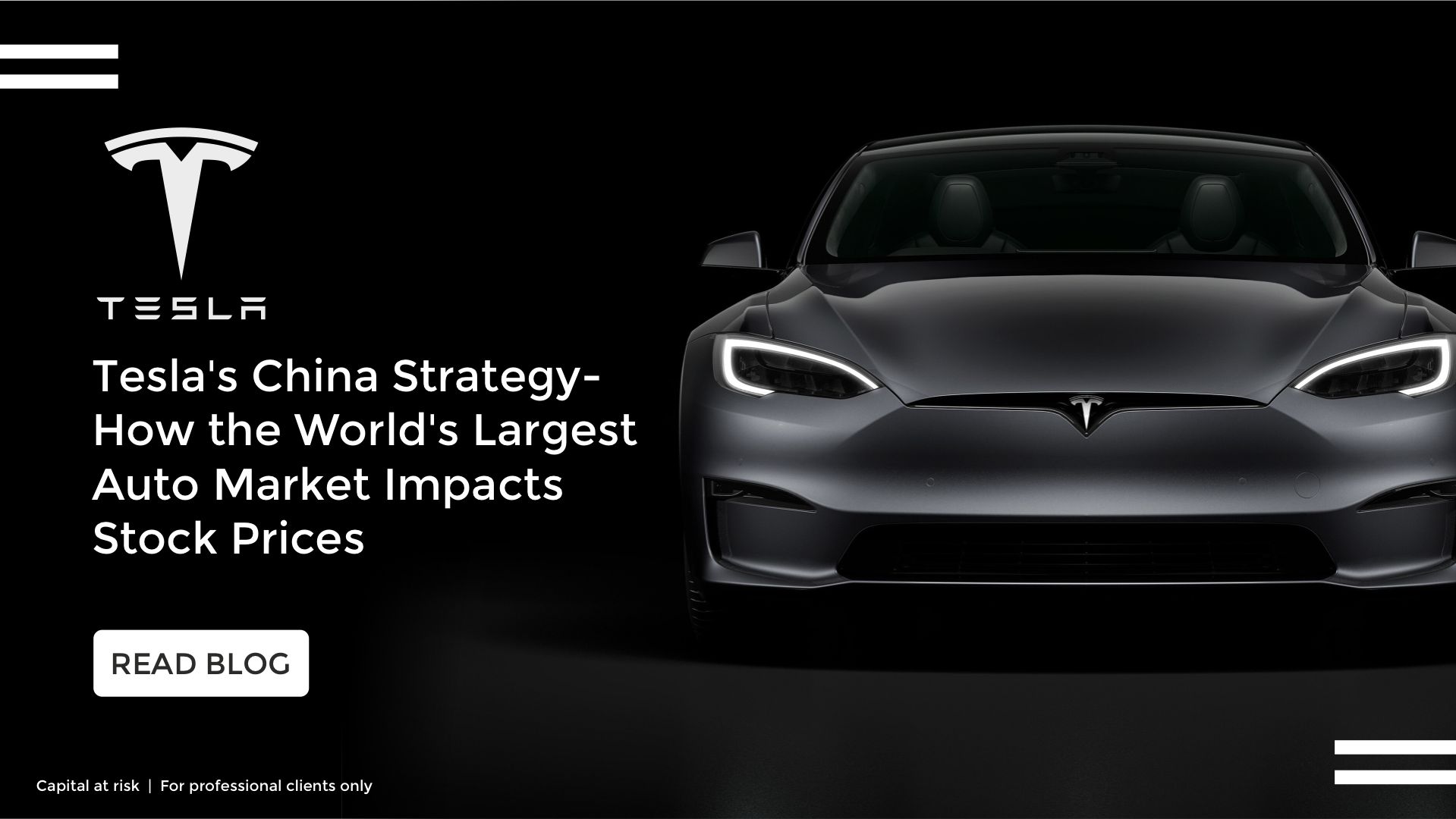Tesla's China Strategy Impacts Stock Prices
Posted:
The US automobile sector is saturated with well-established players such as Ford (F), Honda (HMC), and Chevrolet (GM). However, amidst the competition, one company distinguishes itself – Tesla Motors (TSLA). Tesla, led by CEO Elon Musk, gained prominence in 2012 with the launch of its flagship vehicle, the Model S.
Tesla's strategic foray into the world's largest auto market, China, stands as a pivotal chapter in the company's global expansion. China has become the fastest-growing electric vehicle (EV) market in the world with an estimated 500 electric car makers having piled into the world's largest vehicle market. Against the backdrop of China's ever-changing regulatory landscape and the intense competition in the electric vehicle sector, Tesla's performance in this colossal market takes on profound importance. Let's understand it from the beginning.
Why China is Important for Tesla and the EV Sector?
In 2010, the Chinese government strategically decided to bolster emerging industries, designating the new energy vehicle sector as a crucial area for advancement. Both central and local governments have implemented various industrial policies, including financial subsidies and tax incentives, aimed at propelling industry growth and stimulating market demand.
The sales of new energy vehicles in China have experienced a remarkable surge, escalating from 8,000 EV sales in 2011 to 370,000 to 1,255,000 plug-in hybrid electric vehicles in 2015 sold that year. Furthermore, in 2016 Tesla witnessed China's EV sales triple to 1 billion, and in 2017 reached 2 billion, making it clear that the EV automobile manufacturers had a demand in that country.
Late in 2021, the EV sales in China reached over 3.52 million. Consequently, China has maintained global dominance in new energy vehicle production and sales for seven consecutive years. Pure electric vehicles continue to be the primary category of new energy vehicles, representing the largest share in both production and sales.
Navigating Chinese Regulations
Tesla's foray into the Chinese market has not been without its share of regulatory complexities. The US-China trade war was one of the major obstacles for Tesla to enter the Chinese market with high taxes charged on Tesla's exports to China led to the $80,000 Model S being sold at $140,000.
One way to sell Tesla to Chinese consumers on a large scale in the long term was to build a manufacturing facility in China. However, producing automobiles in China was not cheap and the Chinese government policies there mandate foreign automakers to enter into a joint venture with Chinese companies and share their profits.
In 2018, China finally rolled back its regulations related to joint ventures led to Tesla's entry into China. Elon Musk in July 2018 signed an agreement to build a wholly-owned Gigafactory in Shanghai with 1.6 billion in funding from Chinese Banks and, recording fast approval by the government, Musk constructed the third Tesla’s gigafactory.
The Giga Shanghai was up and building vehicles by August 2019. The gigafactory is at present making around 3,000 cars in a week or 150,000 cars in a year. Moreover,
By August 2019 the plant was already building vehicles. The factory currently makes 3,000 cars a week or around 150,000 a year. By the year-end of 2021, the factory in China was fully operational and Elon Musk planned to sell 500,000 EVs annually
To effectively penetrate the Chinese market, newcomers need to reconsider and adapt their products to leverage the latest technologies prevalent in China. Tesla exemplified this approach with electric vehicles (EVs), capitalizing on advancements in manufacturing and supply chains unique to China.
China accounts for 50% of Tesla's EV sales and 20% of its production capacity. The dynamic nature of regulatory frameworks in China poses an ongoing challenge for Tesla. Changes in policies related to EV subsidies, emissions standards, or manufacturing requirements can have profound implications for the company's operational efficiency and market positioning.
Current Scenario
Fast track to 2023, Tesla which assisted in creating the entire EV industry in China is now facing rising competition in the US as well as from Chinese automakers. The increase in competition triggered a price war in China by Tesla that’s poised to reshape the world’s biggest car market, with hefty discounts threatening to drive some automakers out of business.
It all began in October 2023 when Elon Musk's EV company, a significant player in the fiercely competitive Chinese market, slashed prices on models manufactured at its expansive factory near Shanghai. The situation intensified in January of 2023 with another round of discounts, resulting in Tesla's locally made cars being up to 14% more affordable than the previous year and, in some instances, nearly 50% cheaper than their counterparts in the US and Europe.
In response to Tesla's strategic moves, competitors, including local contenders like Xpeng, Li Auto, and Nio, as well as prominent international brands such as Volkswagen AG and Mercedes-Benz Group AG, found themselves with little choice but to adopt a similar approach. Substantial discounts, reaching up to 70,000 yuan ($10,000), were offered. Ford Motor Co.'s Mach-E electric SUV, for instance, now starts at 209,900 yuan, approximately a third less expensive than its price in the US.
Future Outlook
The path towards a world dominated by electric vehicles doesn't pass through the US; instead, it traverses China. Remarkably, nearly 30% of all car sales in China consist of EVs, while in the US, the figure stands at just 7%. The question arises: how did China manage to outpace the US so comprehensively in the realm of EVs?
China strategically leads in global EV sales as mentioned above with the Chinese government's help in implementing policies and subsidies for lithium batteries to help the EV industry boom. In 2018 Chinese government deliberately loosened its own rules for a US automaker and they had a reason to do so.
With foreign automakers in China, they knew it would prompt competition among the domestic automakers. Chinese automakers then had to compete with domestically produced Tesla providing an incentive to Chinese carmakers to make better EVs and bring down the costs. This strategy worked in the favor of China making it no. 1 exporter globally.
Looking ahead, Tesla faces a landscape in China marked by both challenges and opportunities. The continued growth of the electric vehicle sector in China is likely to intensify competition, with local players vying for market share. Regulatory developments, including changes in subsidies or emissions standards, could present challenges or open new avenues for Tesla.
Moreover, Tesla's long-term strategy in China extends beyond immediate challenges, focusing on sustainable growth and innovation. Expansion plans, both in terms of production capacity and charging infrastructure, are likely to be at the forefront. Strengthening partnerships with local suppliers and further localization efforts could enhance Tesla's competitiveness.
Tesla ETPs by GraniteShares
Tesla ETPs by GraniteShares
| Product name | Ticker | ||
|---|---|---|---|
| USD | EUR | GBX | |
| 3STS | 3STE | 3STP | |
| 3LTS | 3LTE | 3LTP | |
DISCLAIMER
This is a disclaimer stating that all trading and investing comes with risks. Always do your research and do not invest more than you can afford to spend.
GraniteShares accepts no responsibility for any loss or damage resulting directly or indirectly from the use of this blog or the contents.
This blog does not constitute an offer to buy or sell or a solicitation of an offer to buy securities in any company. Nothing contained herein constitutes investment, legal, tax or other advice nor is to be relied upon in making an investment or other decision. No recommendation is made positive or otherwise, regarding individual securities or investments mentioned herein. Any summary list of risk factors does not purport to be a complete enumeration or explanation of the risks involved in a particular investment. Prospective clients must consult with their own legal, tax and financial advisers before deciding to invest. This email contains the opinions of the author and such opinions are subject to change without notice. The source of data is GraniteShares unless otherwise stated. No guarantee is made to the accuracy of the information provided which has been obtained from sources believed to be reliable. This email and the information contained herein is intended only for the use of persons (or entities they represent) to whom it has been provided. Past performance is not a reliable indicator of future results. The value of an investment may go down as well as up and can result in losses, up to and including a total loss of the amount initially invested. Investments may involve numerous risks including, among others, company risks, general market risks, credit risks, foreign exchange risks, interest rate risks, geopolitical risks and liquidity risks. Please note that GraniteShares short and leveraged Exchange Traded Products are for sophisticated investors.


